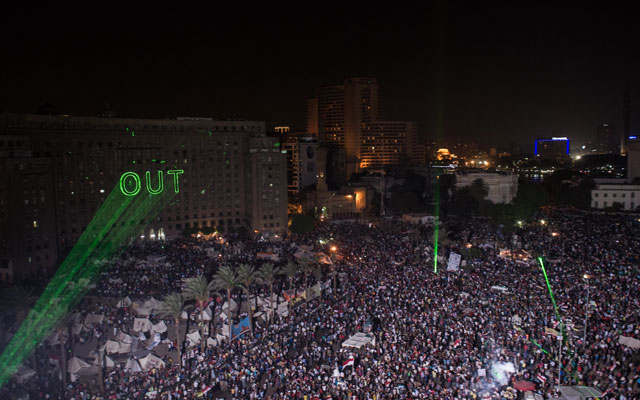Egyptian President Mohamed Morsi, whose authoritarian misrule has provoked massive protests, is desperately clinging to power.
Egypt has been roiled by nationwide demonstrations since Sunday, the first anniversary of Morsi’s inauguration. Protesters demanded that Morsi step down by today and called for early elections. Middle East expert Daniel Pipes has noted that the protests are “probably the largest political demonstration in human history” and dwarfed those that overthrew Egypt’s President Hosni Mubarak in 2011.
While few expected the bull-headed Morsi to heed popular protests, a public warning from Egypt’s armed forces Monday afternoon certainly must have gotten his attention. The military released a televised statement that gave Egypt’s leaders 48 hours to “fulfill the people’s demands” or the military would present a political “roadmap” for the country. Defense Minister General Abdel-Fattah el-Sissi had previously warned that the military would step in to prevent Egypt from entering a “dark tunnel” of civil disorder.
Although widely perceived to be a threat to stage a military coup if Morsi balks at resigning, the military may settle for whittling away Morsi’s power by forcing him to restructure his government, remove some of his Muslim Brotherhood cronies from key positions, and accept early elections. Morsi has publicly rejected the ultimatum and gave a defiant speech on Tuesday that may force the military to take action when its deadline expires on Wednesday afternoon.
President Obama called Morsi on Monday to encourage him to respond to the concerns of the protesters. Meanwhile, an anonymous senior Administration official leaked to CNN that the Administration was urging Morsi to accept early elections while warning Egypt’s military against a coup.
This belated public attempt to conduct an evenhanded policy is lost on Egypt’s opposition, which has long criticized the Obama Administration for strongly backing Morsi’s Islamist government. Egyptian protesters have been carrying signs denouncing President Obama for supporting terrorism, because they are disappointed by Obama’s uncritical support for Morsi, whom they consider to be a terrorist.
During her last visit to Egypt, then-Secretary of State Hillary Clinton was also met by protesters who denounced her for supporting the Muslim Brotherhood. More recently, Egypt’s opposition forces have been highly critical of U.S. Ambassador Anne Patterson, whom they charge is colluding with the Muslim Brotherhood.
Secular, democratic, and liberal Egyptians opposed to an Islamist takeover should be natural allies of the U.S., not leading a backlash against American policy. The fact that Egyptians resent the Obama Administration’s courting of the Muslim Brotherhood should be a wake-up call for the White House.
That is a sad sign that U.S. policy toward Egypt has gone off the rails. The protesters should know that Americans support their efforts to gain more freedom and do not side with an Islamist authoritarian leader who is hostile to American values and to American policies.
The Obama Administration has enthusiastically embraced Morsi and the Muslim Brotherhood. It has turned a blind eye to Morsi’s power grabs, the rising persecution of Egypt’s ancient Coptic Christian minority, the crackdown on pro-democracy nongovernmental organizations that the Mubarak regime formerly tolerated, and the restrictions Morsi’s government has placed on freedom of the press, freedom of speech, and freedom of religion. The Administration needs to get tough with Morsi, or it will find that Egyptians are as disappointed with Obama as Iranians were after he downplayed the Iranian regime’s crackdown against the opposition Green Movement in 2009.
The U.S. should support freedom for the people of Egypt, which is in their best interests and in America’s best interests in the long run. One of the reasons President Morsi is so unpopular is that he has tried to impose an Islamist agenda on Egypt that restricts political, social, religious, and economic freedoms. He has also failed to effectively address Egypt’s festering economic problems, which require urgent reforms.
Washington should warn Morsi against cracking down on his own people and press him to compromise with the opposition. To underscore this message, the U.S. should freeze its aid to Egypt and refuse to release it until Morsi has either stepped down or reached an acceptable deal with the opposition that will safeguard freedom. Aid also needs to be conditioned on Egypt respecting its peace treaty with Israel, cooperating in fighting terrorism, and fully protecting U.S. citizens and property, including the U.S. embassy.
If President Morsi chooses to continue down the path to dictatorship, then it is likely that his regime will be overthrown by a tidal wave of protest or by the Egyptian army, which is likely to emerge as the ultimate arbiter of Egyptian politics.
See: U.S. Should Warn Egyptian President Morsi Against a Crackdown.































